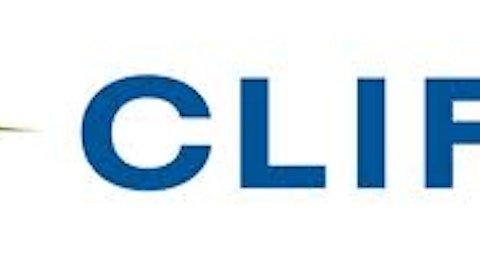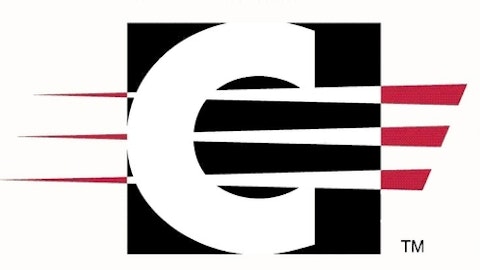When odds continue to stack up, only the toughest can survive. The world’s leading aluminum producer, Alcoa Inc (NYSE:AA), is proving this every day. As the company combats a huge glut in world aluminum production, the falling aluminum prices continue to weigh heavy on performance.
So, is it all over for this aluminum maker? Should investors just abandon it? I think the answer is no. The first-quarter results were a pleasant surprise for analysts and Alcoa Inc (NYSE:AA) still has lots to offer.
A quick recap of the last quarter
Alcoa Inc (NYSE:AA) reported adjusted earnings of $0.11 per share, topping the $0.08 per share estimated by Wall Street analysts. Adjusted EBITDA of $690 million was $66 million higher than the first quarter of 2012. Revenue of $5.83 billion fell a little short of analysts’ expectations of $5.88 billion, on account of lower aluminum prices.
This was a noteworthy performance as it shows the company’s resilience in the face of tough operating conditions. These numbers were on account of some great cost cutting efforts and good profitability in Alcoa Inc (NYSE:AA)’s downstream business. The company ended the quarter with $1.6 billion cash in hand.
The market glut
Alcoa Inc (NYSE:AA)’s woes stem from overcapacity in the aluminum markets. According to Barclay’s, 2013 will be the ninth consecutive year that supply will exceed demand. Analysts are expecting surplus capacity in excess of 1 million tons this year.
The excess will come from China, which is expected to increase its production 10%, or 2.2 million tons this year. Chinese producers are also suffering from the global oversupply, but they have some buffer from the government subsidies and incentives.
China has already doubled its capacity from 9.3 million tons in 2006 to 19.7 million tons last year. This increase pushed up global raw aluminum production to 45.2 million tons in 2012 from 33.9 million tons in 2006.
The excess supply is taking a toll on LME aluminum prices, which stand at $1,864 per ton, down approximately 45% from their 2008 peak. The falling prices are weighing on Alcoa Inc (NYSE:AA)’s raw aluminum sales.
Restructuring
Where problem arises from over capacity the cure can only come from reducing capacity. That is exactly what Alcoa is doing. It is striving to strike a demand-supply balance.
Last year, the company cut 12% production by shutting down its Tennessee facility and rationalizing capacity elsewhere. This year it has closed two production lines at its Baie-Comeau smelter in Canada and postponed the construction of a new line. This will take off another 105,000 metric tons. This year’s closure is part of the 11% or 460,000 tons of capacity reduction goals that the company has set for itself by the end of next year.
Alcoa has reduced its costs considerably. During the first quarter, in aluminum, its cost of production was within top forty-seven percentile among aluminum producers, improving from fifty-first percentile in 2010. Management is chasing a target of bringing this down to the forty-firstpercentile by 2015.
Likewise, in alumina, the company has improved from the 2010-2012 level of 30th percentile and has moved into the twenty-third percentile in the first quarter.
Downstream businesses are strong
Through its Engineered Products and Solutions segment, the company serves industries like aerospace, automobiles, building construction, packaging, etc. The outlook is bright for a lot of these sectors, especially aerospace, which are expected to grow at 11.6% CAGR (2012-2015). Aerospace companies are currently carrying more than eight years of order backlog and Alcoa is well placed to leverage this.
The company has done well to grow its aerospace business. In 2011, it acquired the aerospace fastener business of TransDigm Group, a leading global producer of aircraft components. It currently derives 28% of its value added revenue from aerospace. More than 90% of the aluminum aerospace alloys are developed by Alcoa.
The company also stands to gain from the improvements in North American automobile and construction industries.
Other players
World’s largest miner, Australian company BHP Billiton Limited (ADR) (NYSE:BHP), is slowly selling off aluminum assets or stalling projects. It produces aluminum along with other metals like iron ore and coal. Post the 2008 recession, the latter two commodities have performed relatively better than aluminum.
However, currently BHP’s woes do end with aluminum alone. The weakness in prices of iron ore, which is the company’s largest line of business, is causing its sales to plummet. During the first half of fiscal 2013, the company reported a 14% drop in revenue to $32.2 billion and 58% fall in net profits to $4.24 billion.
Meanwhile, Chalco or Aluminum Corp. of China Limited (ADR) (NYSE:ACH) is also facing the consequences of over capacity, high cost of production, and weak prices. Despite government subsidies, the company had lost RMB 8.2 billion in 2012. The loss trajectory has continued in the first quarter as well, marking six consecutive quarterly losses. The company needs to go through significant restructuring which, among other things, should include more integration of alumina and aluminum operations.
Concluding thought
Despite the current challenges, Alcoa is doing a good job as evidenced by its quarterly results. The ongoing capacity rationalizations and improving outlook of the downstream businesses makes me optimistic about the company. Alcoa has seen numerous ups and downs through its last 125 years of operations, and it should overcome the current challenges.
The article This Aluminum Producer Is Worth Considering originally appeared on Fool.com.
Eshna De has no position in any stocks mentioned. The Motley Fool has no position in any of the stocks mentioned. Eshna is a member of The Motley Fool Blog Network — entries represent the personal opinion of the blogger and are not formally edited.
Copyright © 1995 – 2013 The Motley Fool, LLC. All rights reserved. The Motley Fool has a disclosure policy.






